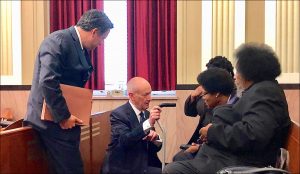
OKLAHOMA CITY, OK – On Friday, September 28, the Oklahoma Court of Criminal Appeals (OCCA) dismissed a petition by death row prisoner Julius Jones, seeking a hearing to present new evidence of racial bias in his case.
This new evidence, revealed by Jones’ legal team and also in the ABC documentary The Last Defense, shows that a juror harbored racial prejudice that could have influenced his vote to convict and sentence Jones to death.
Court documents state a juror said “they should just take that (n-word) out and shoot him behind the jail.”
Jones, an African American, was an honor student and athlete on scholarship at the University of Oklahoma at the time of his arrest. Jones has always maintained his innocence.
“No court has ever considered all the extensive evidence in this case, including evidence of explicit racial bias, police and prosecutorial misconduct, and informant testimony,” said Dale Baich, a federal public defender representing Julius. “We will continue to seek a fair hearing for Mr. Jones, who was wrongfully convicted and has spent 18 years on Oklahoma’s death row for a crime he did not commit.”
According to Baich, in Peña-Rodriguez v. Colorado (2017), the U.S. Supreme Court called racial bias ‘a familiar and recurring evil that, if left unaddressed, would risk systemic injury to the administration of justice.’ “Racial bias was present in Mr. Jones’ case, and we will continue to seek justice,” Baich said.
In April 2017, the Oklahoma Death Penalty Review Commission issued a report detailing numerous systemic flaws within Oklahoma’s capital punishment system. The report included a study about racially disparate capital sentencing outcomes in Oklahoma.
“The U.S. Supreme Court has made it unequivocally clear that our criminal justice system cannot tolerate such blatant examples of racial prejudice on the part of even a single juror,” Baich said. “In this way and many others, Jones’ rights under the state and federal constitutions have been violated and his conviction and death sentence should be overturned.”
In May 2017, Jones’ attorneys reached out to the DA’s office to retrieve a red bandana which they held in evidence, to test for DNA. The only eye witness to the murder stated that the shooter wore a red bandana. Finally, in March 2018 the bandana was release and sent to LabCorp in Virginia, at the expense and direction of Jones’ attorney, a procedure agreed to by the state.
On September 7, the state called a hearing to address the question of whether the district attorney’s office would be able to communicate directly with the DNA testing facility.
With a nearly full courtroom, including Jones’ family and supporters, Oklahoma County District Court Judge Bill Graves ruled that the state cannot unilaterally contact the DNA lab, but joint contact will be allowed, which is what the defense offered two weeks prior to the hearing.
After the hearing Baich stated, “Today’s ruling simply means that, going forward, the parties will jointly confer with the lab conducting the DNA testing. As we represented to the judge at the hearing, that testing is well underway.”
Oklahoma County district attorneys David Prater and Jennifer Hinsburger presented for the state. Michael Robles, with Crowell Moring law firm in New York City, is providing pro bono representation in the Jones’ case. Mark Barrett, from Norman, also presented for Jones.
“This evidence should have been tested 19 years ago,” said Baich. “There is always a concern that with the passage of time, the sample could be degraded or contaminated. Although this hearing is important, DNA testing is just one aspect of this case, which includes overwhelming evidence that not only was Julius Jones wrongfully convicted, but racial bias also contaminated the trial.”
The U.S. Supreme Court has rescheduled the Jones v. Oklahoma case again – for the sixteenth time – with the next possible conference date of Oct. 29. The petition was first filed by Jones’ attorneys in November 2017.
In another development, following discussions between the prosecution and the defense, the state agreed to make its file on Jones available for inspection. Jones’ new defense team, appointed two years ago, had previously requested access to the prosecutor’s file.
This summer, ABC’s documentary, “The Last Defense” drew new attention to the Jones’ case revealing critical new findings from Julius’ legal team, which they believe could be a violation of Jones’s constitutional rights to a fair trial.
“The Last Defense’ put a spotlight on Julius Jones’s case by telling a compelling story about the injustices and racism at play in his case and throughout the criminal justice system as a whole,” Baich said. “The prosecution’s case against Julius has always rested on a shaky foundation. The documentary further exposed that fact. Following a conviction, as a case moves through the courts, procedural technicalities often prevent judges from looking at new and compelling evidence that a person’s constitutional rights have been violated.
“A documentary, unhindered by these technicalities, can educate members of the public about a case, help them understand what happened, and allow them to decide whether to hold their public officials accountable for what went wrong.” Baich added.
The Last Defense is available to watch online.
In a recent op-ed for the National Law Journal, former Florida Supreme Court Chief Justice Gerald Kogan wrote that the Julius Jones case “presents an important opportunity for the U. S. Supreme Court to address racism in the criminal justice system and in application of Oklahoma’s death penalty head-on.” Kogan added, “The court should insist, at the very least, that Jones receives a hearing where all the evidence, including that of racial bias, can be heard. Fairness requires it.”
For more information, visit justiceforjulius.com.
Read The City Sentinel article here.
Tags: death penalty, DNA, Julius Darius Jones, The City Sentinel, wrongful conviction